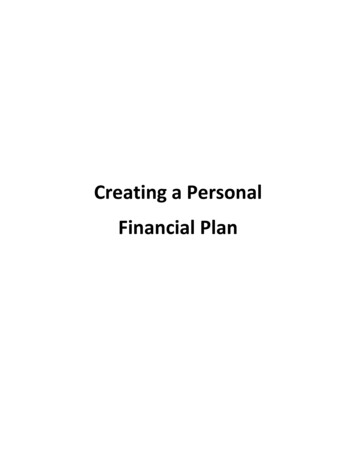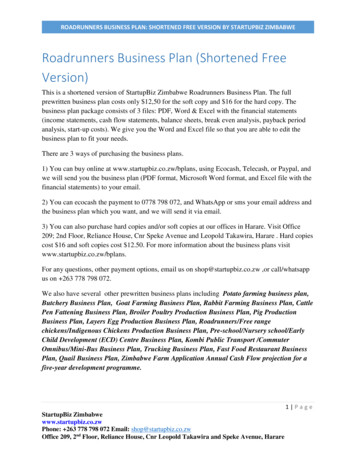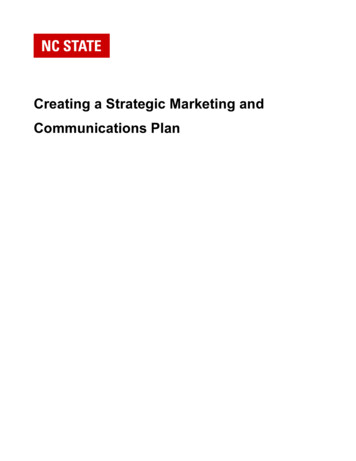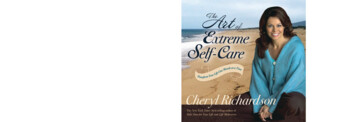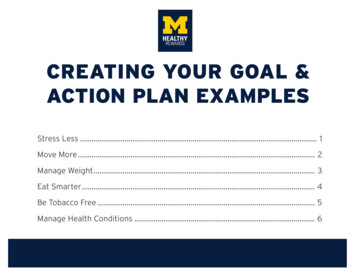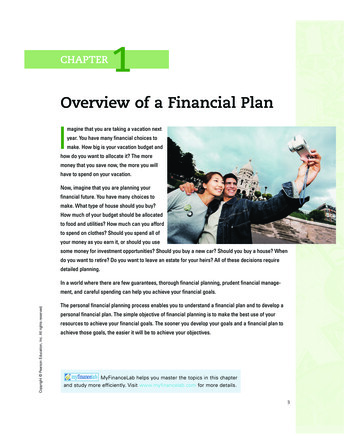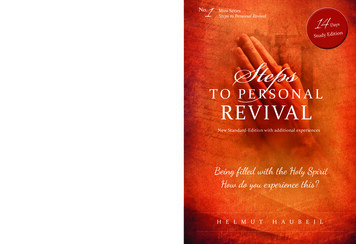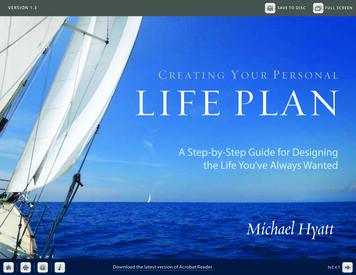
Transcription
VERSION 1.3SAVE TO DISCFULL SCREENC R E AT I N G Y OU R P E R S ONA LLIFE PLANA Step-by-Step Guide for Designingthe Life You’ve Always WantedMichael HyattDownload the latest version of Acrobat ReaderNEXT
C R E AT I N G YO U R P E R S O N A L L I F E P L A NCONTENTS1.Creating Your Plan / 32.Establishing a Weekly Review Process / 333.Staying on Track with a Quarterly Review Process / 404.Using an Annual Time Block / 455.Conclusion / 506.Resources / 537.Author Bio and Contact Information / 578.Worksheets / 609.Endorsements / 8610. Share This e-Book with Others! / 94302 / /94
C R E AT I N G YO U R P E R S O N A L L I F E P L A N1. C REATING Y OUR P LAN303 / /94
C R E AT I N G YO U R P E R S O N A L L I F E P L A NIf we would only give the same amount of reflection to what we wantout of life that we give to the question of what to do with two weeks’vacation, we would be startled at our false standards and the aimlessprocession of our busy days.”— D or ot h y C a n f i e l d Fi s h e r304 / /94
C R E AT I N G YO U R P E R S O N A L L I F E P L A NI HAVE MET VERY FEW PEOPLE WHO HAVE A PLAN FOR THEIR LIVES.Most are passive spectators, watching their lives unfold a day at a time. They may plan their careers,the building of a new home, or even a vacation. But it never occurs to them to plan their life. As aresult, many end up discouraged and disillusioned, wondering where they went wrong.It happened to me.In July of 2000, my boss suddenly resigned. With his departure, I was asked to take his job. I instantlybecame the publisher of Nelson Books, one of the trade book divisions of Thomas Nelson Publishers.I knew our division was in bad shape. But I didn’t know how bad things really were until I assumedthis new role. We were the least profitable division in the entire company. As this began to sink in, Irealized it was going to take a huge amount of work to turn things around.Over the course of the next 18 months, I did very little other than work. I was constantly on the road. Ispent innumerable evenings at the office. So did my team. As a result, we went from being the leastprofitable division of fourteen to the most profitable. I was soon promoted again and given additionalresponsibility.But my success began to take its toll. My health started tofalter.305 / /94
C R E AT I N G YO U R P E R S O N A L L I F E P L A NAs my workload increased, I stopped exercising. I ate more and more junk food and began to gainweight.I eventually ended up in the emergency room, thinking I washaving a heartattack.Thankfully, I wasn’t. But it scared me nearly to death and got my attention.I realized that while I had a plan for my career, I didn’t have a plan for my life. If something didn’tchange, I was going to burn out, break down—or worse.On the recommendation of a friend, I hired Daniel Harkavy, CEO and Executive Coach of BuildingChampions, to be my executive coach. He patiently explained that life didn’t have to be this way. Icould live my life on purpose and with balance. The first assignment he gave me was to create a “LifePlan.”This was the first time I ever thought systematically about what outcomes I wanted to see in themajor categories of my life. “This won’t insulate you from life’s many adversities and unexpected twistsand turns,” Daniel warned, “but it will help you become an active participant in your life, intentionallyshaping your own future.”This experience of creating a life plan, regularly reviewing it, and updating it as necessary, has beentransformational. As my family, friends, career, and other interests have grown, this document haskept me on track, ensuring that I keep everything in balance (more or less).When things get chaotic, my life plan serves as a map. It tells me where I am and how I can get backon the path to my intended destination.!!!!!!306 / /94
C R E AT I N G YO U R P E R S O N A L L I F E P L A NIn this e-book, I will share with you how to create a similar plan for your own life. I am convinced it isone of the most important steps you can take to ensure that you are living a life on purpose,achieving what matters most—in every facet of your life.My plan is surprisingly short; it is only five pages long. It consists of three sections. These are modifiedfrom the excellent life planning process developed by Building Champions and used by permission:1Outcomes2Priorities3Action PlansOUTCOMESIn the Seven Habits of Highly Successful People, bestselling author Stephen Covey says that Habit 2 is to“Begin with the End in Mind.”1 In his excellent book, The E-Myth Revisited, author Michael Gerbermakes the ultimate application of this principle.He says,“I’d like you to imagine that you are about to attend one of the most important occasions ofyour life.1. Stephen Covey, The 7 Habits of Highly Effective People: Powerful Lessons in Personal Change (New York: Free Press, Revised Edition, 2004), 95–144.307 / /94
C R E AT I N G YO U R P E R S O N A L L I F E P L A N“It will be held in a room sufficiently large to seat all of your friends, your family, your businessassociates—anyone and everyone to whom you are important and who is important to you.Can you see it?“The walls are draped with deep golden tapestries. The lighting is subdued, soft, casting awarm glow on the faces of your expectant guests. The chairs are handsomely upholstered ina golden fabric that matches the tapestries. The golden carpeting is deeply piled.“At the front of the room is a dais, and on the dais a large, beautifully decorated table withcandles burning at either end.“On the table, in the center, is the object of everyone’s attention. A large, shining, ornate box.And in the box is you! Stiff as the proverbial board.“Do you see yourself lying in the box, not a dry eye in the room?“Now, listen.”2After reading this short vignette, I asked myself, “What willthey say when I am dead?”This is an incredibly powerful question. To answer it, you have to “fast forward” to the end of your lifeand look back. This exercise forces you to think about the things that matter most.2. Michael Gerber, The E-Myth Revisited: Why Most Small Businesses Don't Work and What to Do About It (New York: HarperCollins, 1995), 137.308 / /94
C R E AT I N G YO U R P E R S O N A L L I F E P L A NI selected six key constituents or audiences that matter to me: God, my spouse, my children, myI selected six keyconstituents or audiences thatmatter to me. . . . I thensimply answered the question,“How do I want them toremember me?”parents, my colleagues, and my friends. (You may have others.) I then simply answered the question,“How do I want them to remember me?”For example, under “My Spouse.” I said this:How I Wa n t t o B e R e m e m b e r e dBy Gail:I want Gail to remember how I loved her, understood her, and helped her accomplishher dreams. I want her to remember specific times that we shared together—timeswe laughed, times we cried, times we spent discussing things that were important toboth of us, and times we just held one another and watched the sunset.Under the “My Colleagues” category, I said this:How I Wa n t t o B e R e m e m b e r e dBy My Colleagues:I want my colleagues to remember my servant-leadership, my integrity, my humility, andmy commitment to having fun. I want them to remember how much they learned andgrew as a result of knowing me. Most of all, I want them to remember how I stoodfor the greatness in them and empowered them to accomplish far more than they everthought possible.309 / /94
C R E AT I N G YO U R P E R S O N A L L I F E P L A NLet us endeavor so to live that when we come to die even the undertakerwill be sorry.”— M a r k Tw a i n3010 / /94
C R E AT I N G YO U R P E R S O N A L L I F E P L A NAs you go through this exercise, I would encourage you to do as Gerber suggests and visualize yourown funeral. I don’t intend this to be morbid, but you must understand that life is short. When you aregone, the only thing you will leave behind is the memories that you have created.What will people be saying about you at your funeral? What will they think as they reflect on theirrelationship with you and your impact on their life?The good news is that you can shape these conversations beginning today.PRIORITIESNext, you need to identify and prioritize your “life accounts.” As Daniel Harkavy. CEO and Head Coachof Building Champions, explains in his book, Becoming a Coaching Leader, life is like a collection ofbank accounts.3 Each has a certain value. A few have large balances, others might have respectablebalances, and one or two might be overdrawn.For example, your career might be going great, but your health account is overdrawn—you are eatingtoo much junk food and you are not exercising regularly. This was my experience.Or perhaps you’re in great shape physically, but your marriage has gone flat. You and your spousehave become like strangers living in the same house.In the Priorities section, your goal is simply to answer the question,“What is important to me?”3. Daniel Harkavy, Becoming a Coaching Leader: A Proven Strategy for Building Your Own Team of Champions (Nashville: Thomas Nelson, 2007),60f.3011 / /94
C R E AT I N G YO U R P E R S O N A L L I F E P L A NBy way of example, I have eight accounts:1. God2. Self3. Gail4. Children5. Friends6. Career7. Finances8. MinistryGodIf you are a Christian, God obviously comes first. Jesus said, “But seek first the kingdom of God and Hisrighteousness, and all these things shall be added to you” (Matthew 6:33).He is the ultimate priority. Until He is first, everything elsewill seem out of kilter.On a practical level, I read the Bible first thing each morning. I want to get a divine perspective on life.I also pray in the morning, either while exercising or on my commute to work. In addition, I praybefore meals, and various points throughout the day, and right before I go to bed. Sometimes, it’sformal; sometimes it’s not. Most often, it’s simply an ongoing conversation.3012 / /94
C R E AT I N G YO U R P E R S O N A L L I F E P L A NSelfPerhaps surprising to some people, I come next. That’s right, me. I don’t think this is because I amselfish or ego-centric. (Okay, maybe a little.)It’s because I can’t take care of anyone else unless I takecare ofmyself.If you travel much by plane, you have probably heard the flight attendant say,“In the event of a change in cabin pressure, panels above your head will open revealingoxygen masks. Pull the mask down toward you to activate the flow of oxygen. Cover yournose and mouth with the mask. Place the elastic band around your head and continue tobreathe normally. Remember to secure your own mask before assisting others.”This is how I look at life. I have to attend to myself first (second only to God) in order to be spiritually,emotionally, intellectually, and physically available to others. If you have trouble with the semantics ofputting yourself second, think of it as preparation to serve others.For example,‣If I don’t feed myself spiritually, I don’t have the spiritual resources necessary to edify others. This isone reason I read the Bible and pray daily.‣If I don’t look after my own health and become sick, I am not much use to my family or myemployees. This is why I run and try to eat nutritionally sound food.3013 / /94
C R E AT I N G YO U R P E R S O N A L L I F E P L A N‣If I don’t make time for reading great books, I don’t have the intellectual resources I need to enrichothers.‣If I don’t make the effort to work through my own emotional wounds, I end up reacting to othersinstead of being in a position to minister to them. This is why I think counseling and therapy is avaluable endeavor for most people.‣If I don’t get sufficient rest, I get grumpy. No one wants to be around me. This is why I try to sleep asolid seven hours every night.Plus, I want to model how to take care of myself, so that my children will take care of themselves.Some people put themselves at the bottom of theirpriorities list, but I think this is a false—and very dangerous—piety. We are in a much better position to serve others whenour basic spiritual, emotional, and physical needs are met.I actually break my Self account into three sub-accounts: Health, Growth, and Rest. That’s howimportant I think this account is to everything else I want to accomplish. To borrow a phrase fromStephen Covey, this is where I “sharpen the saw.”3014 / /94
C R E AT I N G YO U R P E R S O N A L L I F E P L A NSpouseIt would be easy to lump my spouse and my children into one category called “Family.” But these aretwo discrete categories for me. My wife, Gail, takes priority over my children. She came before thechildren entered our lives; she will be around long after they have left home.A good friend once told me,“The most importantgift you can give your children is tolove their mother.”How true—especially in an age when broken homes are increasingly the norm. A healthy marriage isa legacy that will pay dividends to your children and grandchildren for generations.What does this look like from a practical standpoint? It means that Gail and I spend intentional timetogether. For example, Friday night is “date night.” Sometimes we go out alone, sometimes withfriends. Regardless, this is our time to connect with one another.On Saturday mornings, we sometimes walk down to the bakery two blocks from our home and have alate breakfast together. Occasionally, one of my married daughters and grandchildren join us. Wedon’t have a fixed routine for the rest of Saturday. We just kind of let it happen. (We both love it thatway!) On Sunday we go to church and have lunch together with the whole family or as many of themas we can corral.3015 / /94
C R E AT I N G YO U R P E R S O N A L L I F E P L A NBy the way, with regard to “projects around the house,” I follow Clint Eastwood’s advice in the DirtyHarry movies:“A man’s got to know his limitations.”I am the most mechanically-challenged person I know. I know the difference between a hammer anda screwdriver. After that, it gets kind of fuzzy.So, I don’t do a lot of household repairs. I usually ask one of my sons-in-law, hire someone, or—if I waitlong enough—let Gail do it. Seriously, having grown up with four older brothers, she is very good atthis stuff.But, alas, your situation may be different. I know this can be a family activity. It was in Gail’s family. Shegot to spend a lot of time with her dad by helping him around the house.ChildrenMy children come next. Frankly, this was very difficult when my daughters were young. (Did I mentionthat I have five?) I had a hard time balancing my work and my life. Sadly, both Gail and the childrensometimes got relegated to the bottom of the list.Fortunately, this was usually temporary. But I constantly had to fight to keep from neglecting myfamily. When I got too far astray, Gail would gently reel me in. Today, things are much easier. Rightnow, we only have one daughter living at home.3016 / /94
C R E AT I N G YO U R P E R S O N A L L I F E P L A NI usually come home at about the same time every night. I leave the office promptly at 6:00 p.m. NoNot to wax too theological,but we see meals assacramental (small “s” ) and areminder of God’s kingdom.exceptions. We try to eat together as a family as much as we can. Sometimes, especially at this stagein our life, it is often just the two of us.Regardless, we try to make meal time special. Not to wax too theological, but we see meals assacramental (small “s”) and a reminder of God’s kingdom. It’s not just a “pit stop” or a refuelingwe see it as an opportunity tocommune with one another andreconnect with the people weopportunity. Instead, we see it as an opportunity to commune with one another and reconnect withlove most—our family members.When the girls were little, and we were seated at the dinner table, I would ask, “What is the best thingthe people we love most—our family members.that happened to you today?” We still continue that tradition today when we are together. My marrieddaughters even do it with their children. It focuses everyone on the positive events of the day.Sometimes the girls would say (with a big frown or even a few tears), “Nothing good happened today.”My wife, Gail, would always say, “I understand, but if you had to say one thing, what would it be?” Or,“What was the best thing of all the bad things?”We have had some wonderful and amazing conversations based on this simple question. As a result,dinner always lasted for at least thirty minutes—sometimes an hour or more.FriendsAfter family, my next priority is my friends. It wasn’t always this way. I used to think that I got all thesocial interaction I needed at work. As an introvert, when I was away from work, I wanted to be alone.But in the last few years, I have come to appreciate my friends more than ever. I have five “bestfriends” in my inner circle. Gail and I have a couple of close couple friends, too. Nothing is moresatisfying than spending an evening with them—or even a vacation.3017 / /94
C R E AT I N G YO U R P E R S O N A L L I F E P L A NMy goal in these relationships is to achieve “perfect moments.” Eugene O’Kelly, former CEO of KPMG,one of the largest accounting firms in the world, learned about this the hard way. At age 53 he wasdiagnosed with late-stage brain cancer.His doctors soberly told him he had maybe three months to live. He quickly came to the conclusionthat recovery was impossible. A miracle was unlikely.Over the next 90 days, he determined that he would die well. In true CEO-fashion, he created goals forhimself. He made a list of important relationships he wanted to “unwind.” By this he meant that hewanted to bring closure to those relationships and communicate how much each person had meantto him.He also learned to meditate. And, most importantly, he tried to create as many “perfect moments” ashe could. According to O’Kelly, a perfect moment is an experience with others when time stands still.4It is a time full of the present, when the past is left behind and the future is set aside. It is a specialtime of focused attention and heightened awareness.Interruptions and distractions are consciously excluded. Cell phones are off. Hearts are wide open. Allthat matters is this moment—the people I am with and the conversation we are having now.My goal is to make every encounter I have with my friends aperfect moment—for them and for me.To do this, you have to be intentional.4. Eugene O’Kelly, Chasing Daylight: How My Forthcoming Death Transformed My Life (New York: McGraw-Hill, 2007), 110f.3018 / /94
C R E AT I N G YO U R P E R S O N A L L I F E P L A NCareerWork can be a rewardingexperience if you keep itNext comes my career. I think it is really important that this come after God, self, spouse, and children.from becoming an idol.I have seen too many people sacrifice the other four on the altar of work. Usually when that happens,However, if you don’t put ittheir work life crumbles, too.in its place, it can suckthe life out of you.Work can be a rewarding experience if you keep it from becoming an idol. However, if you don’t put itin its place, it can suck the life out of you. No one ever said at the end of his life, “Man, I only wish I hadspent more time at the office.”I only work about fifty-five hours a week. I usually work eight to nine hours during normal work hours.Then I work another hour or so on e-mail after dinner. I also work for a few hours on Sunday eveningas I prepare for the upcoming week.Occasionally, I will work more than this, but never less. If I try to work too much more than this, I find itbecomes counter-productive. In fact, at some point, I believe there is an inverse relationship betweentime at work and productivity. It’s kind of like golf—you play the best when your grip is relaxed.FinancesFor too long, I didn’t give attention to this area of my life. It wasn’t that it wasn’t important, it’s justthat I thought I could outrun my expenses by making more money.In the 1990s, I made a terrible financial mistake. As a result of my success as a writer and a speaker, Imade some significant extra income. I was also holding down a full-time job. I could barely keep upwith it all.3019 / /94
C R E AT I N G YO U R P E R S O N A L L I F E P L A NSo I decided to hire a financial advisor to help me manage my money. I had heard him speak at aconference where I was also a speaker. I was impressed by what he said. We got further acquaintedbackstage during the conference.Long story short, I hired him to assist me in managing my money. At the time, I thought I was verysmart. As it turns out, it was probably the dumbest thing I had ever done in my life—and that’s sayinga lot.The first thing he did was set up a “tax shelter” for my investments. It was creative and brilliant. Or so Ithought. I saved tens of thousands in taxes alone. The only problem was that it turned out to be ascam.I didn’t realize it until four years later when I got a noticefromthe IRS. Talk about something taking your breath away. I almostpassed out.It took me almost three years to get it resolved. I went through agony—an expensive and timeconsuming audit and scores of sleepless nights. The uncertainty of how it would turn out gnawed atme constantly.Thankfully, my nightmare eventually came to an end. But at a big cost. With interest and penalties, Ipaid more than twice my entire investment. It was a miracle that I survived.I learned the hard way that I have to be proactive in managing my money. Now Gail and I sit downonce a month, assess where we are and make the necessary adjustments.3020 / /94
C R E AT I N G YO U R P E R S O N A L L I F E P L A NMinistryAfter work comes my ministry. This is the fruit of everything else. I know some people who put it first,but it quickly becomes a relentless tyrant, squeezing out every other priority.I find that my ministry has a much more powerful impact when everything else is in order. In otherwords, it has to be the fruit of a life well-lived. Perhaps this is why one of the qualifications for achurch leader is that he “rules his own house well” (2 Timothy 3:4)Gail and I have been at the same church for twenty-seven years. Our relationships there are long anddeep. I serve as a deacon and also teach an adult Sunday school class.My greatest joy, however, is leading a formal mentoring group with eight young men. I have beendoing this now for more than a year. We meet twice a month in my home for two hours. We talk abouteverything—God, spouses, children, work, and the temptations and struggles we face as men.Admittedly, this may sound like a lot of activity. But the important thing is that it is intentional. I wantto live my life proactively rather than “sleep-walking” through it. The bottom line is that you don’tneed to get everything done. You only need to get the right things done and leave the rest with God.But how do you live out these priorities in the rough and tumble of daily life? How do you protectthem and ensure that they get the attention they deserve?That’s where Action Plans come in. This is where the proverbial “rubber meets the road.”3021 / /94
C R E AT I N G YO U R P E R S O N A L L I F E P L A NMake no little plans; they have no magic to stir men's blood andprobably will themselves not be realized. Make big plans; aim high inhope and work, remembering that a noble, logical diagram oncerecorded will not die.”— Da n i e l H . B u r n h a m3022 / /94
C R E AT I N G YO U R P E R S O N A L L I F E P L A NACTION PLANSIn your Life Plan, you create an Action Plan for each account. This is where you think through whereyou are and where you want to be. I break each account down into five parts. (Again, this is modifiedfrom Building Champions template and used by permission.)1. Purpose Statement:This is where you state what your purpose is for each account. Again, using my Health account as anexample, I say this:My purpose is to maintain and care for the temple God has given me.The Statement of Purpose for my Friends account is this:My purpose is to befriend and love a few people well who will in turn love, challenge,and hold me accountable.2. Envisioned Future:This is where you describe how the account looks when you have a “positive net worth.” In a financialaccount, it is easy to see. If the number is positive it is good; if it is negative (or red), it is bad.Here, however, you have to do a little more work. You need to describe the account when it isfunctioning at its best, using the present tense, like it is already a reality.For example, here’s the Envisioned Future for my Health account:3023 / /94
C R E AT I N G YO U R P E R S O N A L L I F E P L A NI am lean and strong, possessing vibrant health and extraordinary fitness. My heart isstrong and healthy. My arteries are supple and clear of obstructions. My immunesystem is in excellent condition; I am disease-, infection-, and allergy-resistant. Ihave more than enough energy to accomplish the tasks I undertake. This is because Icontrol my mental focus, workout six days a week, choose healthy foods, takesupplements as needed, and get adequate rest.3. Supporting Verse:A bible verse is optional, of course. It may not be important to you. But it is important to me, because Iwant my life to be built on transcendent values that have stood the test of time.The bible verse I chose for my Children account is this:“Behold, children are a heritage from the LORD, the fruit of the womb is a reward.Like arrows in the hand of a warrior, so are the children of one’s youth.” (Psalm127:3-4, NKJV)The Bible verse for my Career account is this:3024 / /94
C R E AT I N G YO U R P E R S O N A L L I F E P L A NSo he who had received five talents came and brought five other talents, saying,Lord, you delivered to me five talents; look, I have gained five more talents besidesthem. His lord said to him, Well done, good and faithful servant; you were faithful overa few things, I will make you ruler over many things. Enter into the joy of your lord.(Matthew 25:20-21, NKJV)4. Current Reality:Now it’s time to be brutally honest with yourself. Where are you in relationship to your EnvisionedFuture? Don’t pull any punches. The more honest you can be, the more progress you will see.I list these as a series of bullets and try to write down the first things that come to mind without toomuch analysis. For example, here’s what I wrote a while back in my Health account.- I feel great. My stamina is great. It has been a long time since I have been sick.- I feel good about my weight and my overall fitness.- I am running (or cross-training) four days a week for at least 60 minutes.- I am not presently doing consistent strength training. I am concerned this willeventually catch up with me.- I am eating pretty well, but I could be more consistent in avoiding high glycemiccarbs.3025 / /94
C R E AT I N G YO U R P E R S O N A L L I F E P L A NI would share more, but, frankly, it’s too personal. And that is just how you want it. You want it to be sopersonal and so honest that if anyone else read it, you would be embarrassed.Keep in mind that you will not be sharing this document with anyone, except for one or two peopleyou will intentionally enlist to keep you accountable. (In my case, I only share my Life Plan with Dan,my coach, and Gail, my wife.)5. Specific Commitments:This is where you specifically commit to certain actions in order to move from your Current Reality toyour Envisioned Future. Again, I list these as a series of bullets. Using my Health account as anexample, here are my specific commitments:- Run (or cross-train) four days a week.- Do strength training three days a week.- Drink four liters of water a day.- Make healthy food choices, as recommended in The South Beach Diet.- Record everything I eat in LoseIt (a software application that tracks your calorieintake and exercise output).- Get an annual physical and semi-annual dental check-up.I have included the Action Plan for my Rest account on the next page. This will give you an example ofwhat a complete Action Plan looks like.3026 / /94
C R E AT I N G YO U R P E R S O N A L L I F E P L A NA c c o u n t Na m e :RestPu r p o s e Stat e m e n t:My purpose is to pull back periodically from my duties and responsibilities just to reconnectwith the things that are truly important.En v i s i o n e d Fu t u r e :I get adequate time for rest and relaxation. My schedule has a balanced rhythm betweenwork and recovery. I get away at least once a quarter to connect with my vision and corevalues. I get away with Gail twice a year. I get away with my family once a year.S u p p o r t i n g Ve r s e :“Take My yoke upon you and learn from Me, for I am gentle and lowly in heart, and youwill find rest for your souls.” (Matthew 11:29, NKJV)3027 / /94
C R E AT I N G YO U R P E R S O N A L L I F E P L A NC u r r e n t R e a l i t y:- My annual time block needs to be revised.- I skipped my last quarterly review.- I am working too much on the weekends, just to keep up with my blog.- I am usually getting a solid 7 hours of sleep a night. I feel rested.- My travel schedule is actually giving me more opportunities for rest and reflection.Specific Commitments:- Continue getting at least seven hours sleep per night.- Schedule my personal retreats (quarterly reviews) one year in advance. Do them, nomatter what!- DO NOT work longer than noon on Saturday on my blog.- Schedule my personal retreats one year in advance. Do them, no matter what!- Schedule my vacations one year in advance.Here is an Action Plan for my friend Bob’s Finances account (on the next page):3028 / /94
C R E AT I N G YO U R P E R S O N A L L I F E P L A NA c c o u n t Na m e :FinancesPu r p o s e Stat e m e n t:This action plan is from myfriend, Bob, who ismarried to Sharon.My purpose is to be a good and faithful steward of the financial resources God has placedat my disposal.En
CREATING YOUR PERSONAL LIFE PLAN Most are passive spectators, watching their lives unfold a day at a time. They may plan their careers, the building of a new home, or even a vacation. But it never occurs to them to plan their life. As a result, many end up discouraged and disillusi
